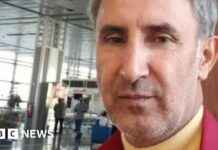He comes from the then multicultural port city of Trieste, survived five concentration camps and is considered the “conscience of Slovenia”. Now the author Boris Pahor has died.
The Italian-Slovenian writer and concentration camp survivor Boris Pahor has died at the age of 108. This was confirmed by Slovenian President Borut Pahor on Monday in a video address published on his website.
“He was an eyewitness, a witness, a reminder,” said the President. «The conscience of Slovenia, Europe and the world. A man who demanded the freedom to think differently and demanded the same freedom for others.”
The portal “delo.si” had previously reported on the death of Boris Pahor at night in his house in the northern Italian port of Trieste, citing the author’s nurse.
He belonged to the Slovene minority in Trieste
Pahor was one of the most important authors in the Slovene language and a great literary witness of the 20th century. His autobiographical and award-winning novel “Necropolis” (1967, German 2001) describes 15 months in five German concentration camps and the fight against death. Other important works are “Fighting Spring” (German 1997) and “Villa am See” (German 2009).
Born on August 26, 1913 in the then Austro-Hungarian Trieste, Pahor’s family belonged to the Slovene minority in the city. The existence of the Slovenes in the then multicultural port city was a leitmotif of his prose, as was the struggle for survival of the prisoners in the German concentration camps and the time after.
Pahor had joined the Slovenian partisans led by the communists during World War II. He was captured by Slovenian SS collaborators in January 1944 and taken to the Dachau concentration camp by the German occupiers. He later survived the Natzweiler-Struthof, Mittelbau-Dora, Harzungen and Bergen-Belsen camps. After the war he returned to Italy, where he studied in Padua and taught at a high school in Trieste.
He also criticized Tito
He later took a critical stance towards communism in Yugoslavia. There he brought up common taboos, such as the summary murder of thousands of actual and alleged German collaborators by the partisans of the lifelong Yugoslav head of state, Josip Broz Tito.
In one of his last interviews on Slovenian television, he said: “I wanted to testify and tell what I experienced so that others can learn how and what can happen.” The Slovenian Ministry of Foreign Affairs honored the deceased as a “support and defender of the Slovenian word”. He fought for the rights of minorities as a staunch opponent of the totalitarianisms – fascism, Nazism and communism – that he had experienced himself.









